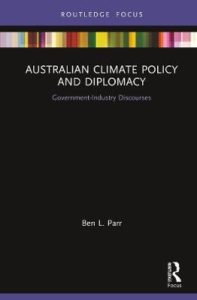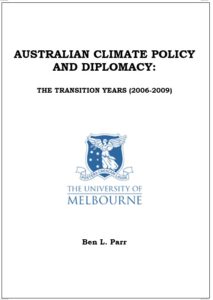Book and PhD Thesis

Australian Climate Policy and Diplomacy: Government–Industry Discourses (Oxon: Routledge, 2020)
Australian Climate Policy and Diplomacy provides a well overdue critique of existing, and high-profile, publications that convey the ‘greenhouse mafia’ hypothesis, which posits that Australia’s weak policy response to climate change is the result of a menacing domestic fossil fuel lobby. Ben L. Parr argues that the shared government–industry discourse about protecting Australia’s industrial competitiveness has had a more decisive influence in shaping and legitimising Australian climate policy than the direct lobbying tactics of the fossil fuel industry. Parr also reveals how the divergent foreign policy discourses and traditions of Australia’s two major political parties – as internationalist versus alliance-focused – have enabled and constrained their climate diplomacy and domestic policies over time. To demonstrate his argument, he presents a discourse analysis woven into a chronological policy narrative comprising more than 1000 primary texts (media releases, interviews, and speeches) generated by prime ministers and key fossil fuel lobbyists between 2010 and 2015 – a period of time covering the Gillard Labor Government and the Abbott Coalition Government. Overall, this volume illustrates how domestic forces have and are influencing Australia’s climate policy. In doing so, it also provides a framework that can be adapted to examine climate mitigation policies in other countries, notably Canada and the US. This book will be of interest to students and scholars of climate change, environmental policy and governance, and Australian climate change policy and politics more specifically, as well as policymakers and practitioners working in these fields. (Available here)

Australian Climate Policy and Diplomacy: The Transition Years (PhD Thesis, University of Melbourne, 2014)
Since the 1980s, scientists have reported that Australia is highly vulnerable to the physical impacts of global warming. Yet despite the warnings, successive Australian federal governments have failed to adopt strong greenhouse gas mitigation policies. The most common explanation for this lack of action has been the political influence of Australia’s powerful mining industry over the policymaking processes and key decision makers.
This thesis seeks to investigate this explanation by examining the relationship between the Australian federal government and the Australian fossil fuel mining lobby during the period 2006-2009, which covers ‘transition years’ between the downfall of the Howard Coalition Government and the early years of the Rudd Labor Government. It critically examines Guy Pearse’s and Clive Hamilton’s popular ‘greenhouse mafia’ hypothesis, which argues that the lobbying tactics of the domestic fossil fuel lobby have largely determined Australian climate policy and, by implication, Australia’s climate diplomacy.
The thesis renovates Robert D. Putman’s two-level games model to explain continuity and change in climate policy and diplomacy. First, it alters the model to better suit the institutional processes in Australia’s parliamentary system. Second, it develops an expanded understanding of power – which focuses on discursive power – that is then translated into Antonio Gramsci’s dual concepts of hegemony and historic bloc. Third, it defends a social constructivist approach to interests.
The central argument of the thesis is that while the activities of the ‘greenhouse mafia’ have certainly been important in shaping Australia’s failure to respond adequately to the climate challenge, it is the existence of a hegemonic discourse about industrial competitiveness (shared between governments of different ideological persuasions and industry actors) that has dominated the construction of Australia’s national interest, and shaped and constrained domestic climate policy and Australia’s international negotiating positions. However, differences in the major political parties’ foreign policy discourses and identities – internationalist versus alliance-focused – have constrained the way the two-level game has been played by the Rudd Labor Government compared to the Howard Coalition Government, which helps to explain variation in climate diplomacy and domestic policy over time. (Available here)
Reviews
This thesis constitutes an outstanding piece of research. The broad conceptual framework is convincing and sophisticated, drawing on research on Gramscian conceptions of power, Putnam’s two-level games thesis, and key recent developments in discourse theory (on storylines, for example) to provide a coherent and compelling theoretical base for analysis. The analysis itself is first rate, and Parr demonstrates familiarity with key secondary literature on these questions while also providing the most detailed analysis of climate policy in this period I have seen. Finally, the arguments are genuinely convincing, and demonstrate a nuance and sophistication of thought for which the author (and his supervisor/s) should be congratulated. In short, this is one of the very best PhD dissertations I have read, and Parr and the supervisors of this dissertation should be encouraged entering it in the Australian Political Studies Association dissertation prize, for example…Once again I want to congratulate Parr on producing an excellent dissertation that makes a genuine contribution to the literature and demonstrates both significant effort and insight. This was a pleasure to read and I have no hesitation in recommending the award of the PhD degree.
– Matt McDonald, Associate Professor of Political Science, University of Queensland, December 2014
It is my opinion that the work presented by Mr Benjamin Parr represents an original, significant, and creative contribution to knowledge about the influence of forces on Australia’s domestic climate policy and international negotiation positions during 2006 to 2009. The candidate’s thesis has certainly contributed significant research that has not been assembled to date. I recommend that the candidate should pursue publication of aspects of his doctoral research in peer-reviewed international journals and also explore publication in its entirety as a book. It is a groundbreaking study refuting the widely accepted arguments to date of Guy Pearse and Clive Hamilton. This research should be of significant interest to academic researchers internationally, as well as those in government, business and industry, and NGOs in Australia, in demystifying why successive Australian federal governments have failed to adopt strong greenhouse as mitigation policies.
– Ros Taplin, Professor of Environmental Management, University of NSW, January 2015
Other Research
Submissions
Submission to the Climate Change (State Action) Amendment Bill 2021, Tasmanian Policy Exchange (TPE), University of Tasmania, November 2021.
A Blueprint for a Climate-Positive Tasmania: A Submission to the Review of Tasmania’s Climate Change Act and Climate Action Plan, TPE, University of Tasmania, April 2021.
University of Tasmania’s Submission to the Draft Renewable Energy Coordination Framework, TPE, University of Tasmania, March 2021.
Tasmania’s Renewable Energy Future: UTAS’s Submission to the Draft Tasmanian Renewable Energy Action Plan, TPE, University of Tasmania, September 2020.
Discussion Papers
Towards a Climate-Positive Tasmania, Discussion Paper, TPE, University of Tasmania, October 2021.
A Future for All of Us: Making Tasmania a Global Climate Leader by 2030, Discussion Paper, the Office of Senator Nick McKim, May 2019.
Growing a Clean Economy: Opportunities for Australian States and Territories, Discussion Paper, Melbourne Sustainable Society Institute, University of Melbourne, February 2018.
Australian States and Territories Clean Economy Agreement, Internal “Discussion Document” that produced the Climate Leadership Declaration between state and territory governments, signed 13 July 2017.
Reports
Driving Net-Zero: Options for Reducing Tasmania’s Transport Emissions, Technical Policy Paper, Tasmanian Policy Exchange (TPE), University of Tasmania, July 2023.
The Social Acceptability of Emerging and Innovative Industries in Key Emitting Sectors in Australia and Abroad (Alternative Proteins, Low Carbon Metals, Zero Emissions Road Transport, and Renewable Energy and Storage), University of Tasmania, July 2022 (Draft).
Social Research Insights: Literature Review (academic and non-academic) on Customer Responses to Virtual Power Plants in Australia, Interim Update Report, University of Tasmania, March 2022.
Developing a Future Energy Research Plan for Tasmania, Short Report, TPE and Future Energy (with TasNetworks, Hydro Tasmania and Aurora Energy), University of Tasmania, November 2021.
Summary and Review of the Submissions to the Tasmanian Climate Act and Climate Plan, Short Report, TPE, University of Tasmania, June 2021.
Carbon Offsetting in Tasmania: Key Issues and Opportunities, Report, TPE, University of Tasmania, March 2021 (Draft).
Brief Review of the Submissions to the Tasmanian Renewable Energy Action Plan, Short Report, TPE, University of Tasmania, November 2020.
Survey on Energy Research and Innovation Centres in Australia, Short Report, TPE, University of Tasmania, September 2020.
Tasmania’s Future Renewable Energy Workforce Needs, Short Report, TPE , University of Tasmania, June 2020.
Towards Better Governance: Integrating Climate Change Risks and Opportunities into Financial Decision Making, Short Report, Kingborough Council Municipality, March 2020 (Draft).
Policy Briefs
Australian State and Territory Government Land Clearing Regimes: Problems and Solutions (Draft).
Federal Policies and Programs to Advance the use of Asparagopsis (seaweed) in Tasmanian Agriculture, Policy Brief, TPE, University of Tasmania, January 2022.
The ALP’s ‘Powering Australia’ Policy with an Extended Discussion on the Safeguard Mechanism, Policy Brief, TPE, University of Tasmania, December 2021.
Issues of Clarification and Concern Regarding Tasmania’s Net-Zero Target, Policy Brief, TPE, University of Tasmania, October 2021.
Conceptualising UTAS’s ‘Spheres of Influence’ on Climate Change, Policy Brief, TPE for the University Strategic Forum presentation, August 2021.
‘Vision’: A Critical Ingredient in Developing Tasmania’s Low Emissions Future, Policy Brief, TPE, University of Tasmania, August 2021.
Towards Good Climate Governance: Challenges and Opportunities to Mainstream Climate Action in Tasmania, Policy Brief, TPE, University of Tasmania, July 2021.
Contextualising Origin Energy’s Hydrogen Plans at Bell Bay: A Background Briefing, Policy Brief, TPE, University of Tasmania, July 2021.
The Case for Manufacturing Emission-Free Electric Vehicle Batteries in Tasmania, Policy Brief, TPE, University of Tasmania, June 2021.
Bioenergy (Biofuel and Biomass) in Tasmania: The Essential Background, Policy Brief, TPE, University of Tasmania, February 2021.
Is Tasmania a World Leader on Climate Change?, Policy Brief, TPE, University of Tasmania, December 2020.
Reframing Business Competitiveness to Achieve Net Zero Emissions in Tasmania: Opportunities for Heavy Industry, Transport, and Agriculture, Policy Brief, TPE, University of Tasmania, November 2020.
Assessment of the Federal Government’s Low-Emissions Technology Investment Roadmap, and its Implications for Tasmania, Policy Brief, TPE, University of Tasmania, October 2020.
Are Tasmania’s Hydrogen Certification Interests Compatible with the Commonwealth’s?, Policy Brief, TPE, University of Tasmania, July 2020.
Building a Competitive Zero-Emission Tasmanian Economy, Policy Brief, TPE, University of Tasmania, April 2020.
Opinion Editorials
‘Renewable Energy Plan Will Only Work if All Tasmanians Benefit’, The Mercury (Hobart), 7 November 2020.
‘Renewables Plan Can Spark Advanced Manufacturing and Zero-Emissions Economy’, The Mercury (Hobart), 16 May 2020.
‘Fossil Fuel Growth Centre Harks Back to Old Ideas about Climate Costs’, The Conversation (Australia), 26 February 2016.
‘Australia is Set to Ratify the Second Part of Kyoto Protocol – But it’s Not a Done Deal’, The Conversation (Australia), 1 December 2015.
‘Australia Needs a Fresh Start on Climate Policy: Authority’, The Conversation (Australia), 30 November 2015.
Presentations
‘Australia’s Revisionist Competitiveness Agenda’, Presentation, University of Melbourne, October 2023.
‘Developing an Energy Research Plan: Results and Pathways Forward’, Presentation to UTAS Future Energy, TasNetworks, Aurora Energy and Hydro Tasmania, November 2021. (slides)
‘How Tasmania Can Make a Difference in the World’, Launch of Discussion Paper with senators Nick McKim and Christine Milne, Hobart, 13 May 2019.
‘Myth Busting Tasmanian Climate Policy’, New Laws for Nature New Tasmania, Hobart, 17 April 2019.
‘Australian Climate Policy and Politics’, Guest Lecture, School of Politics and International Relations, La Trobe University, Melbourne, 10 August 2016.
‘Climate Change and Competitiveness in Australian Agriculture’, Centre for Education and Research in Environmental Strategies, Melbourne, 15 August 2015.
‘Australian Climate Policy and Diplomacy: The Transition Years, John Howard to Kevin Rudd’, PhD Completion Seminar, School of Social and Political Science, University of Melbourne, 23 September 2014.
‘Australian Climate Change Discourses: Double-Edged Diplomacy from Hawke to Rudd’, PhD Confirmation Seminar, School of Social and Political Science, University of Melbourne, 15 November 2010.